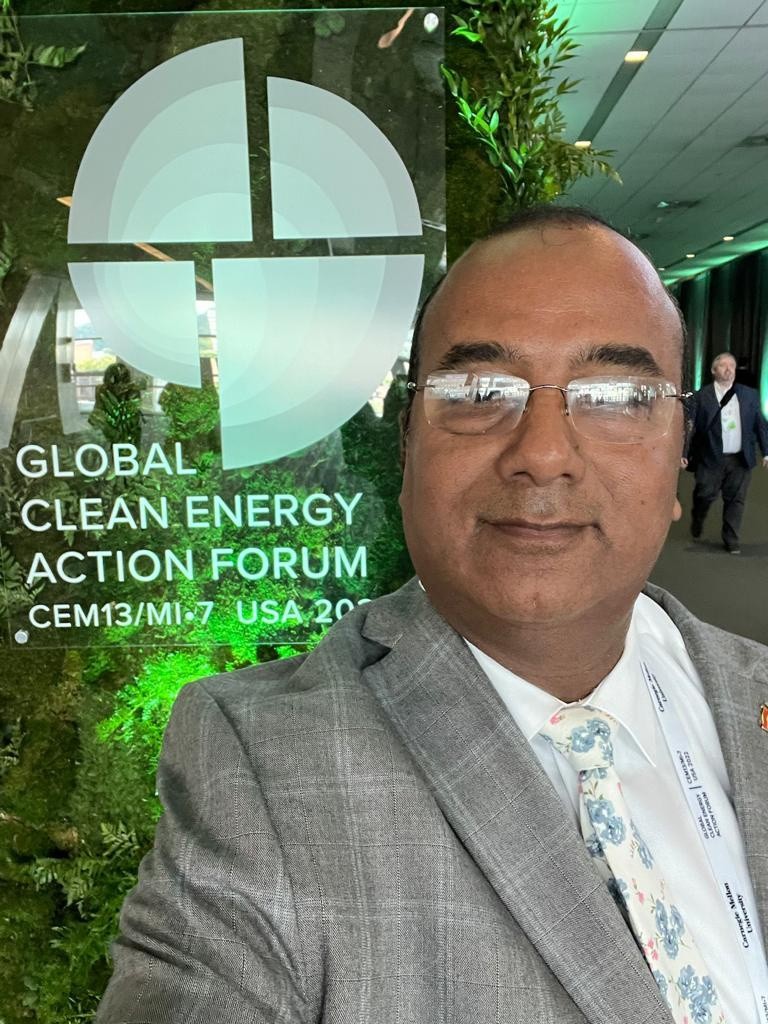
Dr. Pallav Prakash, a strategist and leader in sustainable technology, wants to take Electric Vehicles (EVs) on the path to a cleaner and more sustainable future. From his time in the Indian Navy as a submarine officer to his current work deploying EV school buses at scale using Vehicle-to-Grid (V2G) technology, he has immersed himself in making the best use of the battery technology used in wars, to further the future of our society.
And the future of our society is inextricably intertwined with sustainable energy. The past few decades have seen leaps and strides in the adoption of sustainable practices. The United Nations and many powerful countries have made goals and agreements to bring about global change for the betterment of the planet we live on. We all want to leave behind a world in which future generations can enjoy living. That desire is something Pallav wholeheartedly espouses.
"If future generations can benefit from a technology that impacts well-being, then I have achieved my aim," he says, as he reflects on his future vision for EV technology, "That is what gives me satisfaction."
Usage of EV technology for mobility is an old phenomenon. It's been used for far more challenging situations, such as in undersea excursions and in space exploration, and to excellent effect. "Deploying it on land is far easier," Pallav says, his knowledge suffusing his words with conviction.
Deployment of EV school buses that uses V2G technologies in the K-12 education system in the United States has many benefits. Not only does it support renewable energy goals in the US, but it also betters the electric grid system in the way it supplies energy to communities. The V2G system allows school buses to store energy when required, and be of use when sitting idle and not transporting children. Which, unfortunately, is most of the time. Not only would the energy storage neutralize capital investment in stationary storage, but also account for costs to school districts due to its return on investment. "It is an intrinsic in-built solution to offset inbuilt costs," Pallav says.
"My work is also in alignment with governmental goals for a cleaner and more sustainable future," Pallav explains enthusiastically, "The EV school bus initiative is a critical and priority area of interest for the US. It is also one of their first efforts to move towards more renewable transportation systems. My work supports their goals. I suppose I am working hard alongside governmental agencies to deploy cleaner tech."
Indeed, the US is moving towards a cleaner future. The 2021 Infrastructure Investment and Jobs act has a clearly stated objective of investing in and deploying EV technology in school buses across the country. Worldwide interest in a cleaner future is reflected in the United Nation's sustainability goals, two of which apply to Pallav's work.
UN sustainability goal 3 expresses the desire to "Ensure healthy lives and promote well-being for all at all ages" and UN sustainability goal 7 sets forth the target of ensuring "access to affordable, reliable, sustainable and modern energy for all".
"I know deploying EV school buses fulfills some of the sustainability goals of the UN, especially since it will positively impact the health of children. After all, not only will the technology be offering cleaner rides to school going children, but also will be providing a cleaner environment and healthier community for these children to grow up in."
It could be said that the true definition of sustainability is making a better future for future generations. Or, more presently, for the children who will grow up to be the next generation. And sustainable initiatives focused on children, the ones that impact children directly, is the cream of the crop.
Children learn about the world through education. They learn about what is possible and what their potential to affect change is through what they see. And a lot of what they see is at school. Education is the highway to change, and EV school buses drive them there. Not only do these sustainable vehicles provide a healthy environment for children, but they also show them that sustainable change can be made. That they too can grow up and affect change in the world. It normalizes sustainability, it makes it possible instead of just remaining as potential.
Dr. Pallav Prakash is at the forefront of this drive to uplift the children who pave the path to the future.
[Dr. Pallav Prakash currently works as a Program Manager at Zum Services Inc. and
leads the company's EV vertical and initiative on the Net Zero Transition. He is also a judge at the Stanford University for the subject of 'Value creation for the Real Economy', as well as a mentor to the students at the Blum Center for Developing Economies, University of California at Berkeley. Pallav is an alumnus of The Johns Hopkins University and Indian Institute of Management, Lucknow, India]
ⓒ 2025 TECHTIMES.com All rights reserved. Do not reproduce without permission.




